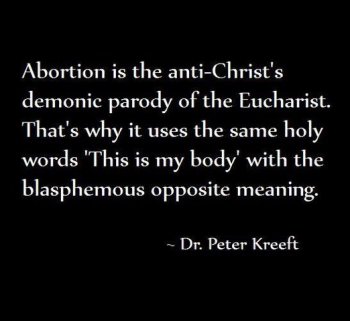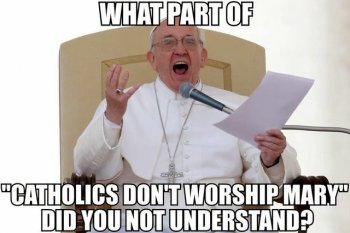That is not what Philip James said. He said, "...scripture came forth from the Church..." The Church did not make scripture inspired, she canonized what was always inspired from the moment they were written. Canonization means the inspired scriptures were proven to be inspired, and made binding on all Christians. This complicated process took 4 councils and 3.5 centuries to complete. Denying the tradition of the episcopate that made compilation of the inspired books possible is contradictory, illogical and demands your standard false history. It's a straw man fallacy.
More straw man fallacies. "repeatedly reoffered" is a stupid anti-Catholic slogan that is as old as John Knox.
Exodus 12:14,17,24; cf. 24:8 – we see that the feast of the paschal lamb is a perpetual ordinance. It lasts forever. But it had not yet been fulfilled.
Exodus 29:38-39 – God commands the Israelites to “offer” (poieseis) the lambs upon the altar. The word “offer” is the
same verb Jesus would use to institute the Eucharistic offering of Himself.
Lev. 7:15 – the Aaronic sacrifices absolutely had to be eaten in order to restore communion with God. These sacrifices all foreshadow the one eternal sacrifice which must also be eaten to restore communion with God. This is the Eucharist (from the Greek word “eukaristia” which means “thanksgiving”).
Matt. 26:29; Mark 14:25 – Jesus is celebrating the Passover seder meal with the apostles which requires them to drink four cups of wine. But Jesus only presents the first three cups. He stops at the Third Cup (called “Cup of Blessing” – that is why Paul in 1 Cor. 10:16 uses the phrase “Cup of Blessing” to refer to the Eucharist – he ties the seder meal to the Eucharistic sacrifice). But Jesus conspicuously tells his apostles that He is omitting the Fourth Cup called the “Cup of Consummation.” The Gospel writers point this critical omission of the seder meal out to us
to demonstrate that the Eucharistic sacrifice and the sacrifice on the cross are one and the same sacrifice, and the sacrifice would not be completed until Jesus drank the Fourth Cup on the cross.
Matt. 26:30; Mark 14:26 – they sung the great Hallel, which traditionally followed the Third Cup of the seder meal, but did not drink the Fourth Cup of Consummation. The Passover sacrifice had begun, but was not yet finished. It continued in the Garden of Gethsemane and was consummated on the cross.
Luke 22:19; 1 Cor. 11:24-25 – the translation of Jesus’ words of consecration is “
touto poieite tan eman anamnasin.” Jesus literally said “offer this as my memorial sacrifice.” The word “poiein” (do) refers to offering a sacrifice (see, e.g., Exodus 29:38-39, where God uses the same word – poieseis – regarding the sacrifice of the lambs on the altar). The word “anamnesis” (remembrance) also refers to a sacrifice which is really or actually made present in time by the power of God, as it reminds God of the actual event (see, e.g., Heb. 10:3; Num. 10:10).
It is not just a memorial of a past event, but a past event made present in time.
Lev. 24:7 – the word “memorial” in Hebrew in the sacrificial sense is “azkarah” which means to actually make present (see Lev. 2:2,9,16;5:12;6:5; Num.5:26 where “azkarah” refers to sacrifices that are currently offered and thus present in time). Jesus’ instruction to offer the bread and wine (which He changed into His body and blood) as a “memorial offering” demonstrates that the offering of His body and blood is made present in time over and over again.
Num. 10:10 – in this verse, “remembrance” refers to a sacrifice, not just a symbolic memorial. So Jesus’ command to offer the memorial “in remembrance” of Him demonstrates that the memorial offering is indeed a sacrifice currently offered. It is a re-presentation of the actual sacrifice made present in time.
It is as if the curtain of history is drawn and Calvary is made present to us.
Heb. 9:23 – in this verse, the author writes that the Old Testament sacrifices were only copies of the heavenly things, but now heaven has better “sacrifices” than these. Why is the heavenly sacrifice called “sacrifices,” in the plural?
Jesus died once. This is because, while Christ’s sacrifice is transcendent in heaven, it touches down on earth and is sacramentally re-presented over and over again from the rising of the sun to its setting around the world by the priests of Christ’s Church. This is because all moments to God are present in their immediacy, and when we offer the memorial sacrifice to God, we ask God to make the sacrifice that is eternally present to Him also present to us.
Jesus’ sacrifice also transcends time and space because it was the sacrifice of God Himself.
1 Cor. 10:16 – “the cup of blessing” or Third cup makes present the actual paschal sacrifice of Christ, the Lamb who was slain.
Heb. 4:3 – God’s works were finished from the foundation of the world. This means that God’s works, including Christ’s sacrifice (the single act that secured the redemption of our souls and bodies), are forever present in eternity.
Jesus’ suffering is over and done with (because suffering was earthly and temporal),
but His sacrifice is eternal, because His priesthood is eternal (His victimized state was only temporal).
Heb. 7:24 – Jesus holds His priesthood is forever because He continues forever, so His sacrificial offering is forever. He continues to offer His body and blood to us because He is forever our High Priest.
Philip James tried to tell you that the multitude of Masses around the world is ONE sacrifice of Bread and Wine. But to you, his text is invisible, and so is mine.
1 Corinthians 10:17
For we being many are one bread, and one body: for we are all partakers of that one bread.
View attachment 3576




